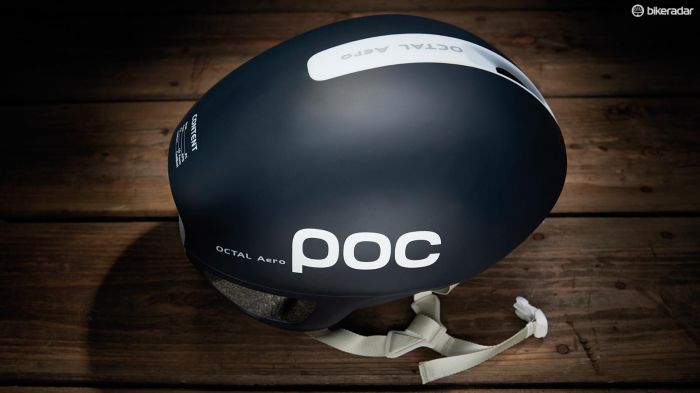You can trust Cyclingnews

This article originally appeared on BikeRadar
From the outside, the Octal Aero has a bold and slick... well, 'aero'... look – it even reminds us a bit of a Russian soldier's helmet, or perhaps something out of Star Wars. Internally, though, it looks the same as the standard Octal lid, the obvious difference being the one-piece polycarbonate shell that's neatly bonded to the helmet's largest circumference.
- Highs: Fit, security, weight, decent airflow
- Lows: Price, divisive style
- Buy if: You like the looks and your wallet can stand the outlay
POC says this thin shell acts as a monocoque to further enhances the helmet's strength and integrity. Although it flexes with minimal pressure where it spans gaps in the EPS (expanded polystyrene) core, it's bonded in place wherever possible, so should at least equal the protection of an equivalent vented helmet. The lower part of the helmet has a complete in-mould shell enclosing the strap anchors, which are themselves moulded in position.
Adding a shell usually increases weight, but at 268g for our large size, the Octal Aero's extra mass isn't worth worrying about. Even so, this is certainly a substantial helmet, its rounded shape attributable to extra-thick EPS at the temples and rear of the head – your most vulnerable areas.
Whereas POC's AVIP range was all about rider safety, Raceday shifts the focus to target aero efficiency for the competitive rider. Reducing ventilation to a single central vent is great aerodynamically, and is helped by internal channels that begin at the brow. These three main channels are very deep and wide, and are directly aligned with the main rear exhaust vent. Three further sizeable openings at the back draw warm air from the helmet, and in normal conditions we were very comfortable, with a constant flow of air across the head and no obvious hot spots, but it probably wouldn't be our first choice for a summer Alpine assault.
Fit is controlled by a minimal system with five height settings, a wide occipital cradle and rotary dial, and the superbly adjustable straps are kept away from your skin as much as possible. Limited use of Polygiene anti-odour-treated Coolbest padding reduces the skull contact area to maximise airflow without harming comfort.
If the looks work for you, and you can afford it, the Octal Aero is undoubtedly fast, comfortable and sufficiently ventilated for most needs. The only question for the style-conscious is where can we rest our glasses?